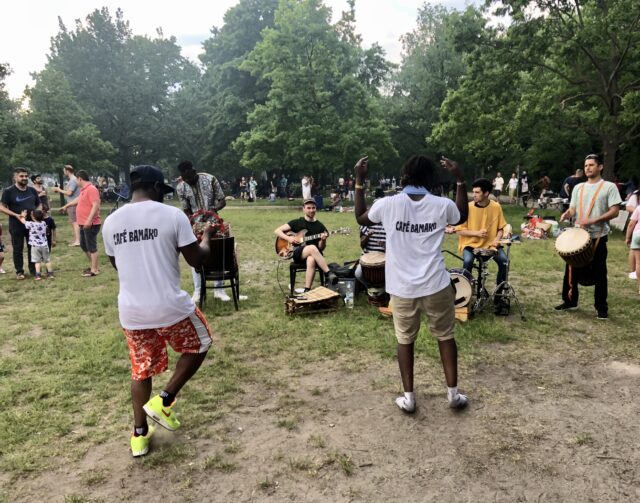Staking a claim for inclusive societies: the importance of stakeholders for fostering youth participation
Year of production: 2021
The Erasmus+ programme provides possibilities for young people and educators with fewer opportunities to participate in international learning and training mobilities across Europe and beyond. Similarly, the European Solidarity Corps (ESC) supports short and long-term volunteering programmes for young people as well as the chance for them to initiate Solidarity Projects in their local communities.
Involving young people with fewer opportunities in European youth work projects benefits them, as well as our societies. It empowers them to make positive contributions in their communities and to claim a greater stake in society, as recent research shows. However, there are a number of factors, identified in the EU’s Inclusion and Diversity strategy, that can serve as barriers to participation in educational projects on the one hand, and civil society on the other. This is especially true amongst young people who face cultural differences, economic obstacles, and barriers linked to discrimination. This article will explore the important yet perhaps under emphasised role that project stakeholders can play in helping to overcome these barriers and to foster youth participation amongst young people with fewer opportunities.

Community Members
Inclusion projects can greatly benefit from collaboration with community members, as the case study of the Cafe Bamako project in Berlin shows. Cafe Bamako is a local Solidarity Project, funded within the framework of the European Solidarity Corps. It is organised by young people, including young people from the city’s West African communities, and actively supported by members of the city’s Malian community, who help to organise events and activities, present the project and its results to their wider community, and provide feedback about the project’s impact. These include older adults who are already active in their communities and are trying to improve the wellbeing and opportunities of their peers. The project provides them with a platform, resources and – importantly – recognition of the valuable contribution they are making to civil society. A flagship project taking place in Helsinki, Inclusive Cities: Preventing Social Conflicts in Public Space, provides another example of the important role played by community members in inclusion projects. Here, minority group representatives in Helsinki’s Puhos neighbourhood helped to collect the opinions of local residents about the controversial proposal to demolish a local shopping centre – material which was published in this community booklet. Without their involvement, it is difficult to imagine the project being so successful in providing local people with a voice on such an important local issue.
Community members are attuned to the concrete needs facing young people and provide vital communication channels between youth organisations and the target groups they strive to engage. In order to ensure that they identify with a project, its methods and goals, it is important to engage them in project planning at the conceptual development stage, before the phase of the activity’s implementation. A project that engages community stakeholders can create valuable synergies through an alignment of interests between the organisation and its stakeholders. It also provides an opportunity for youth organisations to build their knowledge base and expertise through integrating these individuals into the organisation and its activities.
Partner Organisations
Inclusion projects can work with a broad range of partner organisations and service providers, all of which pose their own benefits and challenges. Whether organising a cultural activity, a hybrid event, or an outdoor education project, such stakeholders can play a central role in facilitating inclusion and diversity within youth work. In the Café Bamako project, participants have been cooperating with the local band the Heart Beats of Africa, who provide the musical energy which fuels the project’s cultural events. Together with a further service provider, Studio dB, the group has worked with the band to create their first feature length music video. The cooperation has led to a domino effect whereby the stakeholder’s interests are aligned with the development of the project – and in turn the project gains new participants in the form of the band members, their fans, and their wider social circle.
In Amsterdam, a flagship local Solidarity Project, Discover Black History: Building Strong Communities, cooperated with the Black Archives and the Tropenmuseum to provide tours engaging with black history and reflecting on the city’s historical connection with slavery. Similarly, in Poznan, the NGO Logos’s Solidarity Project, Dinner4foreigner, cooperates with local restaurants and community gardens to host events and picnics showcasing the cuisine of immigrant communities in the city. As the head of Logos Polska, Marko Boyko, puts it: “ stakeholders improve our outreach, help to spread out values and our message, and enable us to break out of the bubble of the youth work sector. Through our cooperation, we can in turn disseminate information about the activities of our stakeholders and the values that they stand for, which creates a snowball effect that is beneficial to both partners.”
Employers
Participating in Erasmus+ staff or learning mobility can involve travelling to a foreign country and taking part in five days of activities, sometimes more. Indeed, getting the time free from work is one of the main barriers to participation in international mobility projects experienced amongst those with economic obstacles or with refugee or asylum status. Why is this? Amongst this target group, employment is often the main priority. A full-time job greatly increases their chances of being granted extended or permanent residency, and it enables them to support their communities back home. Holidays, when taken, are often an opportunity to visit family. Other participants facing economic obstacles find themselves precariously employed in the black market or shadow economy and know that if they request time off they will most likely lose the work that they have. Whether in stable or unstable employment, there is a widespread and understandable unwillingness to “rock the boat” and gain the disapproval of employers.
Employers themselves may be initially sceptical of supporting their staff members’ participation in international mobility, as they might not be aware of the benefits that non-formal education can bring, both in terms of personal and professional development. Therefore, it is essential to communicate to employers – at least the legitimate ones – the benefits that participation in a mobility project can bring to their employees and workplace in general. Participation in international mobilities improves valuable skills such as intercultural communication, self-confidence, teamwork, leadership, organisation, time-management – competences that can be directly applied to the workplace. And these competences are identified and explained in the Youthpass and other forms of certification obtained as a result of participation in an international mobility project.
Conclusion
Stakeholders clearly have an important role to play in fostering youth participation. They provide valuable expertise and resources, helping to foster cross-sectoral synergies between youth work and other sectors. Moreover, the engagement of community stakeholders enables a better understanding of the needs of disadvantaged target groups, helping to foster long-term and sustainable links between youth work organisations and the communities they are seeking to engage. As the experience of the projects discussed here shows, the best results are achieved when stakeholders are integrated into the planning stages of inclusion projects. And an alignment of interests between inclusion projects and their stakeholders is the best recipe for success.





